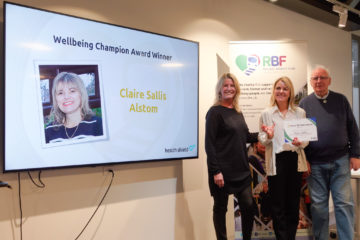How can you keep everyone’s spirits up while Covid 19 restrictions continue?
By Sarah Lewis, C.Psychol., Appreciating Change
 For individuals and for families lockdown has proved challenging. We don’t know how soon we’ll get back to normal or how long the lifting of restrictions will take.
For individuals and for families lockdown has proved challenging. We don’t know how soon we’ll get back to normal or how long the lifting of restrictions will take.
As the threat from the virus is real what can we do to manage the anxiety that many of us feel about the situation?
Here are some ideas for you try with resources to help you navigate the difficult times that we find ourselves in.
1.Enjoy a chuckle
Action for you to take: Laughing has been proved to be good for us and for our immune system. Whatever tickles your funny bone. Remember, coronavirus may be no laughing matter, but we don’t have to be solemn to be serious. Chuckling or laughing loudly are good coping mechanisms.
Resource: Your favourite YouTube video. It might be hilarious puppies or work related, for example, Tripp and Tyler: A Conference Call in Real Life.
2.Try some self-coaching
Action for you to take: When feeling really stuck we can often rely on informal chats with colleagues to stimulate our thinking or for new ideas. Sometimes we just need to be asked a question that gives us a different take on the subject or causes us to make a new connection. Self-coaching helps move you into a more productive self-talk, that allows you find unexpected ways forward.
Resource to help you: ‘At My Best’ offer an excellent selection of forty-eight coaching questions in their ‘Good Question Card’ pack.
3. Keep exercising and eating well
Action for you to take: Make sure you eat healthily. Lots of fruit and vegetables are good for immune system. Exercise is very important to both mental and physical health. You know the rules about keeping your distance. Put your face mask on and yomp for an hour somewhere green. Alternatively, you could try an online workout session.
Resource to help you: The Joe Wicks workouts, ‘Seven days of sweat’
4. Have longer-term projects on the go
Action for you to take: We need to look forward, hoping for the best. Starting projects suggests an optimism about the future that becomes self-reinforcing. The hardest part to start, but once you do it will draw you forward. I’ve started a tapestry kit which will take an age. But every evening I can admire the couple of square inches I’ve completed and feel I’m making progress.
Resource to help you: Positran do a great set of resilience building cards called ‘Positive Transformation Cards’. They’re full of uplifting quotes and insightful questions to help you boost your optimism in a mindful way.
5. Call a friend
 Action for you to take: Social contact also is very important to our wellbeing. Talk to at least one person who isn’t living with you, every day.
Action for you to take: Social contact also is very important to our wellbeing. Talk to at least one person who isn’t living with you, every day.
I suggest you also ask them about their plans for the day, what they are hoping to achieve during this period of lockdown.
In other words, try to help them see a silver lining.
Resource to help you: Your phone, Facetime, Skype, Zoom etc. And your beloved friends!
6. Find absorbing activities
Action for you to take: When we’re completely absorbed in something, we’re not focused on how we feel, rather, we’re in a state of ‘flow’. It’s like getting a holiday from your worried self.
Complicated cooking (or these days ‘creating from what we have got to hand’) and gardening offer me productive escape time. Sometimes it’s hard to get going, but once you’ve started to apply yourself, time falls away as you get into a ‘flow state’.
Resource to help you: The book, ‘Positive Psychology at Work’ explains flow and other positive psychology concepts that might be useful right now.
7. Blessings – count them daily!
Action for you to take: At the end of each day do the Positive Psychology ‘Three blessings exercise’. Take some quiet time and identify three good things that have happened during the day. It’s good practice to write them down. Doing this regularly helps train your brain to look for the positives amongst the gloom and find the silver linings.
Resource to help you: Vanessa Keys excellent book: 10 keys to happier living.
8. Manage your news feed etc.
Action for you to take: Following the news minute-by-minute is not likely to do you any good. Take positive control and limit your daily diet. You might choose to read rather than watch the news. There is less ‘emotional contagion’ from the written word than from a voice, so less transmission of anxiety.
Resource to help you: Positrans’s science based ‘Positive Action Cards’ will help you improve your wellbeing.
9. Make regular worry appointments
Action for you to take: Some of us are born worriers. If you are someone who finds worrying reassuring, try to limit it so it doesn’t become overwhelming. A time-honoured technique is ‘allowing’ yourself a specific allotted time to worry as much as you like. Make a diary entry and spend say, 20 minutes allowing yourself to name all work and personal worries. Record them in a notebook if you like. Allocating this time, should reduce the likelihood of doing your waking to worry at 4am.
Resource to help you: your appointment system and a diary/notebook.
10. Making the best of life
Action for you to take: Find out more about Appreciative Living which about seeing and seeking out the best of life. Despite everything, we can still appreciate the things that make life worth living, today. It takes practice, but the benefit to our health, state of mind and ability to remain pro-active in the face of threat, in fact to our resilience, that Appreciative Living provides is beyond question.
Resource to help you: Jackie Kelm is the guru of Appreciative Living. You’ll find her latest book, Appreciative Living, via Amazon and her videos on YouTube. Or try the Appreciative Inquiry card pack, with pictures, quotes and questions.
ABOUT THE AUTHOR
 Sarah Lewis C.Psychol., is the principal psychologist at Appreciating Change, a strengths-based psychological consultancy that is committed to applying well-researched positive psychology ideas and interventions to workplace challenges and opportunities at an individual, team or whole organisation level.
Sarah Lewis C.Psychol., is the principal psychologist at Appreciating Change, a strengths-based psychological consultancy that is committed to applying well-researched positive psychology ideas and interventions to workplace challenges and opportunities at an individual, team or whole organisation level.
Sarah is an associated fellow of the British Psychological Society, a principal member of the Association of Business Psychologists, and a member of the International Positive Psychology Association.
Sarah is an acknowledged Appreciative Inquiry and Positive Psychology expert, a regular conference presenter and author of ‘Positive Psychology at Work’ (Wiley), Positive Psychology and Change (Wiley), ‘Appreciative Inquiry for Change Management’ (KoganPage) and Positive Psychology in Business (Pavilion).
She also collects great positive psychology resources to support consultants, trainers and coaches in their work which are sold through the Positive Psychology online shop. https://www.thepositivepsychologyshop.com/
More information: https://acukltd.com
Twitter: https://twitter.com/sarahlewis1
LinkedIn: https://www.linkedin.com/in/sarahlewis1













